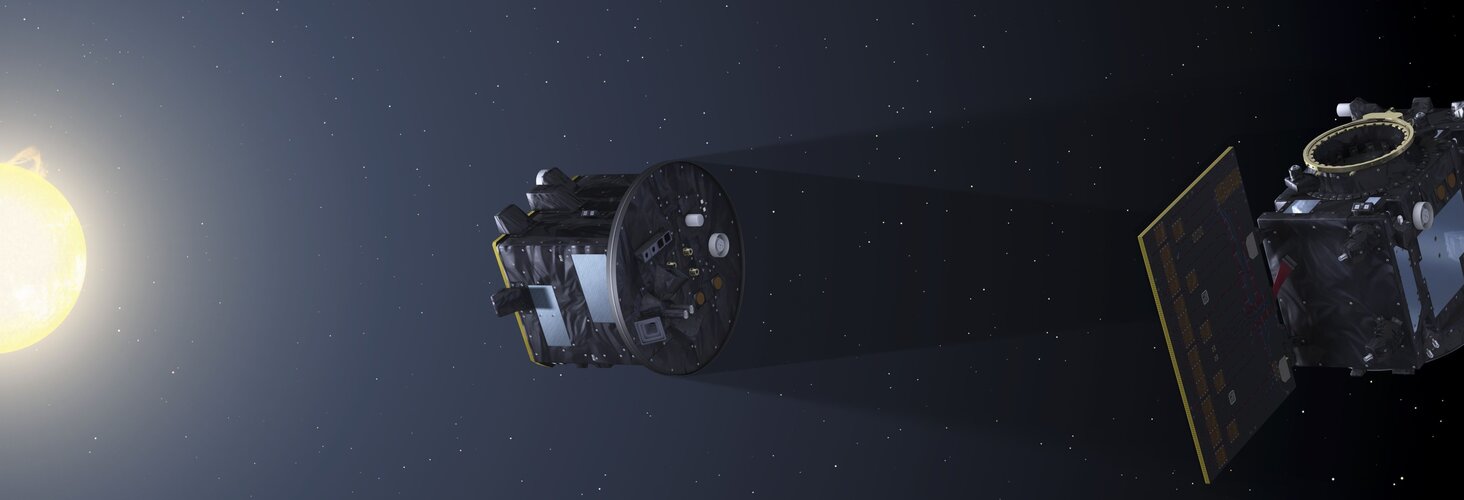NASA's crew capsule had heat shield issues during Artemis I
Friday, 13 December 2024 08:02 Off the coast of Baja California in December 2022, sun sparkled over the rippling sea as waves sloshed around the USS Portland dock ship. Navy officials on the deck scrutinized the sky in search of a sign. The glow appeared suddenly.
A tiny spot at first, it gradually grew to a round circle falling at a great speed from the fringes of space. It was NASA's Orion capsule, which would soon en
Off the coast of Baja California in December 2022, sun sparkled over the rippling sea as waves sloshed around the USS Portland dock ship. Navy officials on the deck scrutinized the sky in search of a sign. The glow appeared suddenly.
A tiny spot at first, it gradually grew to a round circle falling at a great speed from the fringes of space. It was NASA's Orion capsule, which would soon en Earth from Space: Jakobshavn Glacier, Greenland
Friday, 13 December 2024 08:00 Image:
These summer images from the Copernicus Sentinel-2 and Sentinel-1 missions showcase different satellite views of Greenland’s west coast.
Image:
These summer images from the Copernicus Sentinel-2 and Sentinel-1 missions showcase different satellite views of Greenland’s west coast. ESA and Nokia demonstrate advanced AI applications with space-enabled 5G
Friday, 13 December 2024 08:00
ESA and Nokia have successfully demonstrated how advanced artificial intelligence (AI) combined with space-enabled 5G networks can perform unprecedented real-time activities – from early wildfire detection to remote infrastructure inspection and immersive multimedia experiences in rural areas.
Growing a business: from apps to software for space on Proba-3
Friday, 13 December 2024 07:55
A key element of ESA’s role as Europe’s space agency is the expansion of space knowhow, by encouraging new actors into the field. Case in point: a Polish software company previously specialising in smartphone apps took on the challenge of designing the operating system for the main instrument of Proba-3 – an ambitious double spacecraft mission to reveal secrets of the Sun’s fiery atmosphere, the corona.
NASA's crew capsule had heat shield issues during Artemis I - an aerospace expert on these critical spacecraft components
Friday, 13 December 2024 07:51 Off the coast of Baja California in December 2022, sun sparkled over the rippling sea as waves sloshed around the USS Portland dock ship. Navy officials on the deck scrutinized the sky in search of a sign. The glow appeared suddenly.
A tiny spot at first, it gradually grew to a round circle falling at a great speed from the fringes of space. It was NASA's Orion capsule, which would soon en
Off the coast of Baja California in December 2022, sun sparkled over the rippling sea as waves sloshed around the USS Portland dock ship. Navy officials on the deck scrutinized the sky in search of a sign. The glow appeared suddenly.
A tiny spot at first, it gradually grew to a round circle falling at a great speed from the fringes of space. It was NASA's Orion capsule, which would soon en ESA to collaborate with ISRO on Gaganyaan missions
Friday, 13 December 2024 07:51 On December 4, 2024, the European Space Agency (ESA) and the Indian Space Research Organisation (ISRO) formalized an agreement that establishes ESA's support for India's Gaganyaan human spaceflight program. This collaboration will leverage ESA's ground station capabilities to aid ISRO's ambitious mission to send humans into space.
Gaganyaan is India's inaugural human spaceflight initiative
On December 4, 2024, the European Space Agency (ESA) and the Indian Space Research Organisation (ISRO) formalized an agreement that establishes ESA's support for India's Gaganyaan human spaceflight program. This collaboration will leverage ESA's ground station capabilities to aid ISRO's ambitious mission to send humans into space.
Gaganyaan is India's inaugural human spaceflight initiative Undeterred by Friday the 13th, SpaceX plans pair of launches
Friday, 13 December 2024 07:51 SpaceX plans to launch 23 Starlink communications satellites into low-Earth orbit from Vandenberg Space Force Base in California Friday morning, weather permitting.
The planned 11:28 a.m. PT liftoff will be the first of a pair of SpaceX launches scheduled for Friday the 13th. The other will carry a GPS navigation satellite into orbit from Cape Canaveral Space Force Station in Florida so
SpaceX plans to launch 23 Starlink communications satellites into low-Earth orbit from Vandenberg Space Force Base in California Friday morning, weather permitting.
The planned 11:28 a.m. PT liftoff will be the first of a pair of SpaceX launches scheduled for Friday the 13th. The other will carry a GPS navigation satellite into orbit from Cape Canaveral Space Force Station in Florida so China successfully tests XZY 1 verification rocket engine
Friday, 13 December 2024 07:51 China's XZY 1 verification rocket has successfully completed a static firing test at Haiyang Oriental Aerospace Port in Shandong province, marking a major milestone for the nation's aerospace innovation.
Developed by Beijing Jianyuan Technology Co Ltd, also known as Space Epoch, the XZY 1 is a medium-lift launch vehicle with a stainless steel body powered by liquid oxygen-methane engines.
China's XZY 1 verification rocket has successfully completed a static firing test at Haiyang Oriental Aerospace Port in Shandong province, marking a major milestone for the nation's aerospace innovation.
Developed by Beijing Jianyuan Technology Co Ltd, also known as Space Epoch, the XZY 1 is a medium-lift launch vehicle with a stainless steel body powered by liquid oxygen-methane engines. It's an Asteroid, it's a Comet, it's the Geminids Meteor Shower!
Friday, 13 December 2024 07:51 The Geminids meteor shower is back for its annual December show of beautiful bright and fast meteors. The Geminids, which will peak on the night between Dec 13 - 14 in 2024, is considered to be one of the best and most reliable annual meteor showers.
h3>Where Did the Geminids Originate and What Makes it Different? /h3>
The debris causing the Geminids originated from an asteroid known as
The Geminids meteor shower is back for its annual December show of beautiful bright and fast meteors. The Geminids, which will peak on the night between Dec 13 - 14 in 2024, is considered to be one of the best and most reliable annual meteor showers.
h3>Where Did the Geminids Originate and What Makes it Different? /h3>
The debris causing the Geminids originated from an asteroid known as NASA performs first aircraft accident investigation on another world
Friday, 13 December 2024 07:51 Engineers from NASA's Jet Propulsion Laboratory in Southern California and AeroVironment are completing a detailed assessment of the Ingenuity Mars Helicopter's final flight on Jan. 18, 2024, which will be published in the next few weeks as a NASA technical report. Designed as a technology demonstration to perform up to five experimental test flights over 30 days, Ingenuity was the first aircraf
Engineers from NASA's Jet Propulsion Laboratory in Southern California and AeroVironment are completing a detailed assessment of the Ingenuity Mars Helicopter's final flight on Jan. 18, 2024, which will be published in the next few weeks as a NASA technical report. Designed as a technology demonstration to perform up to five experimental test flights over 30 days, Ingenuity was the first aircraf Hubble reveals stunning edge-on view of spiral galaxy
Friday, 13 December 2024 07:51 The NASA/ESA Hubble Space Telescope has provided an extraordinary image of the spiral galaxy UGC 10043, located approximately 150 million light-years from Earth in the Serpens constellation. Viewed edge-on, this galaxy offers a rare perspective, with its spiral arms hidden from view, revealing a sharp profile against the cosmic backdrop.
In this edge-on orientation, UGC 10043's disk appear
The NASA/ESA Hubble Space Telescope has provided an extraordinary image of the spiral galaxy UGC 10043, located approximately 150 million light-years from Earth in the Serpens constellation. Viewed edge-on, this galaxy offers a rare perspective, with its spiral arms hidden from view, revealing a sharp profile against the cosmic backdrop.
In this edge-on orientation, UGC 10043's disk appear A film capacitor that can take the heat
Friday, 13 December 2024 07:51 The Department of Energy's Lawrence Berkeley National Laboratory (Berkeley Lab) and several collaborating institutions have successfully demonstrated a machine-learning technique to accelerate discovery of materials for film capacitors - crucial components in electrification and renewable energy technologies. The technique was used to screen a library of nearly 50,000 chemical structures to iden
The Department of Energy's Lawrence Berkeley National Laboratory (Berkeley Lab) and several collaborating institutions have successfully demonstrated a machine-learning technique to accelerate discovery of materials for film capacitors - crucial components in electrification and renewable energy technologies. The technique was used to screen a library of nearly 50,000 chemical structures to iden Chengdu emerges as a hub for satellite components and aerospace innovation
Friday, 13 December 2024 07:51 A state-of-the-art manufacturing base dedicated to commercial satellite components has commenced operations in Chengdu, Sichuan province. Once fully operational, the facility will have the capacity to support over 1,000 commercial satellites annually.
The project, situated in the Chengdu Future Science and Technology City, was developed by Beijing-based Aotian Technology. Specializing in h
A state-of-the-art manufacturing base dedicated to commercial satellite components has commenced operations in Chengdu, Sichuan province. Once fully operational, the facility will have the capacity to support over 1,000 commercial satellites annually.
The project, situated in the Chengdu Future Science and Technology City, was developed by Beijing-based Aotian Technology. Specializing in h Google unveils latest AI model, Gemini 2.0
Friday, 13 December 2024 07:51 Google on Wednesday announced the launch of Gemini 2.0, its most advanced artificial intelligence model to date, as the world's tech giants race to take the lead in the fast developing technology.
CEO Sundar Pichai said the new model would mark what the company calls "a new agentic era" in AI development, with AI models designed to understand and make decisions about the world around you.
Google on Wednesday announced the launch of Gemini 2.0, its most advanced artificial intelligence model to date, as the world's tech giants race to take the lead in the fast developing technology.
CEO Sundar Pichai said the new model would mark what the company calls "a new agentic era" in AI development, with AI models designed to understand and make decisions about the world around you. How Deinococcus Radiodurans thrives in extreme radiation
Friday, 13 December 2024 07:51 Deinococcus radiodurans, nicknamed "Conan the Bacterium," is renowned for its extraordinary ability to endure extreme conditions, including radiation levels thousands of times higher than lethal doses for humans and other organisms. Researchers from Northwestern University and the Uniformed Services University (USU) have identified the mechanism behind its resilience, offering insights that coul
Deinococcus radiodurans, nicknamed "Conan the Bacterium," is renowned for its extraordinary ability to endure extreme conditions, including radiation levels thousands of times higher than lethal doses for humans and other organisms. Researchers from Northwestern University and the Uniformed Services University (USU) have identified the mechanism behind its resilience, offering insights that coul 
